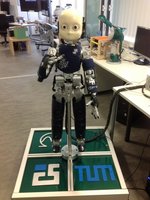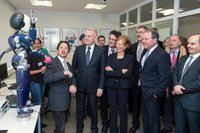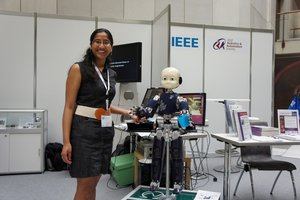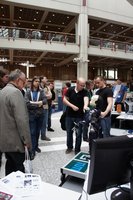iCub
The iCub was developed to study cognition through the implementation of a humanoid robot the size of a 3.5 year old child. It was created by the RobotCub project, a 5 years long project funded by the European Commission through Unit E5 "Cognitive Systems, Interaction & Robotics". More information is available on the ICub project's website.
iCub Features (version 1.4)
- The overall weight of the iCub is 22kg.
- The size is that of a 3.5 years old child (approximately 100cm high).
- The robot has 53 actuated degrees of freedom that move the head, arms & hands, waist, and legs.
Degrees of Freedom (DoF)
It utilises tendon driven joints for the hand and shoulder and has more than 30 degrees of freedom (DOF) allocated in the upper part of the body:
- 7 DoF in each arm
- 9 DoF in each hand (3 for the thumb, 2 for the index, 2 for the middle finger, 1 for the coupled ring and little finger, 1 for the adduction/abduction)
- 3 in the torso/waist
Also, it has 6 DoF in the head:
- 3 DoF for the neck
- 3 DoF for the cameras (eyes) and
- 12 DoF allocated on the lower body
- 6 DoF in each leg
iCub Sensors
From the sensory point of view the iCub is equipped with:
- digital cameras
- gyroscopes and accelerometers
- microphones
- force/torque sensors
- A distributed capacitive sensorized skin
- The finger tips can be equipped with tactile touch sensors
- has red LEDs representing mouth and eyes mounted behind the face panel for making facial expressions.
Processing Unit and Software
The robot was not designed for autonomous operation, and is consequently not equipped with onboard batteries or processors required for this - instead an umbilical cable provides power and a network connection to an external processing unit is provided.
The iCub software was developed on top of Yarp. Yarp is a set of libraries that support modularity and provides an interface with the hardware.
Public Demonstrations
Our iCub has had several public demonstrations. Here your can find some of them.
Demonstration to the French Prime Minister
From TUM News: The French Prime Minister Jean-Marc Ayrault today visited the Technische Universität München. TUM President Wolfgang A. Herrmann gave the head of government an insight into the university’s research profile and development. The Institute for Cognitive Systems then presented several research projects, including a sensitive skin for robots.



